This is a blog dedicated to discussing, raising awareness and documenting the issues, harms and dangers of the sex trade, commonly known as sex work, focusing primarily on prostitution and pornography. We are against sex work (the sex trade and term) but not against the sex industry members (victims). Check our our main community on Reddit: https://www.reddit.com/r/antisexwork/
Last active 4 hours ago
Don't wanna be here? Send us removal request.
Text
How to Talk to Your Kids About Porn and Restrict Their Access to It
In an age where access to explicit content is just a click away, addressing the topic of pornography becomes increasingly crucial. However, I've noticed that many parents struggle with how to broach the subject effectively while also implementing measures to safeguard their children's online experiences. Here is a practical guide I've put together on how to start the conversation about porn with your kids and restrict their access to it:
Start Early:
A Common Sense Media survey found that the average age at which most children are exposed to pornography is 12 years old; 15% first saw pornography when they were 10 years old or younger. So, start the conversation early and keep it age appropriate. You can always expand upon it as they grow older.
Educate and Create an Open Environment:
Empower your kids by educating them in an honest and ongoing conversation about the harms of porn. Encourage your children to ask questions and express their thoughts and concerns without fear of judgment. Let them know that they can come to you with any worries or uncertainties they may have about what they see online.
To help facilitate these conversations, consider using this conversational blueprint on how to talk about porn with them or utilize resources such as Culture Reframed's free courses. These courses provide parents with valuable knowledge, skills, and confidence to discuss the role of pornography in today's culture with young people. They emphasize the importance of explaining to children why and how pornography can be harmful, while reinforcing the message that they should never feel pressured to engage in any intimate activity that makes them feel uncomfortable, ashamed, or frightened.
Alternatively consider reading "How to Talk to Your Kids about Pornography" by Dina Alexander, Amanda Scott and Jenny Web or the free guide "How to Talk to Kids About Pornography" by Defend Young Minds.
Additionally, show your child the porn critical documentary miniseries "Brain, Heart, World," consisting of three episodes aimed to be an educational resource for those in middle school and older.
Use Technology Safeguards:
Utilize parental control software, hardware, internet filters and built-in mobile and tablet settings to restrict access to inappropriate websites (and social media if you want to go further). Familiarize yourself with the privacy settings of the devices and platforms your child uses, and regularly monitor their online activity.
Restrict access to mobile and tablet: Both mobile phones and tablets have built-in settings to restrict access to adult websites, including pornographic websites. One can either set up such restrictions from the parent’s mobile (family group) or on the child’s mobile and tablet directly. To do this:
Apple mobile phones and tablets:
On the child’s device: Go to settings. Select Screen Time. Select this is my device, or your child’s device. Choose Content and Privacy. Select Content Restrictions. Select Online Content and Restrict Adult Websites.
From your device: First, you need to create your own Apple ID for kids (your child must be signed in to the mobile or tablet with this account). Enter Screen Time. Select your child. Choose Content and Privacy. Enter a code. Select Content Restrictions. Select Online Content and Restrict Adult Websites.
Android mobile phones and tablets:
On your child’s device: Go to the browser with this link here and turn on “secure search.” Read more about this here. Remember that children can turn this on and off unless you use the option below.
From your device: First, create a Google Account for each of the children younger than 13 (your child must be signed in to their mobile or tablet with this account). Install the “family link” app. Open the app. Find your child’s name in the app. Select Manage Settings. Select Google Chrome. Select Try to Block Websites That Aren’t Child-Friendly. Also, select Safe Search inside Google Search in the Family Link app.
Install software: These programs (apps) can give parents a lot of control. Many of them require paid subscriptions, although some have free trials.
Explore options based on your family's budget and needs**.** Here are some examples: Bark, Relay, Raise, Gabb, Canopy, Pinwheel, Net Nanny, MobiCrip, Qustodio, OurPact.
Review the settings**.** Try out free trials from reputable companies to get a sense of what they offer. Options can range from blocking certain websites (not just porn) to getting alerts if your child uses specific search terms. Look for programs that work with your devices and feel manageable to you.
Go the hardware route: Hardware can let you monitor every device on the Wi-Fi network in your home. Like parental control software, many include paid subscriptions. They don't cover children's devices when they connect to other networks, like at a friend's house or out in public.
Determine your existing setup. Your internet router may already have built-in filtering services you might not have explored yet. Open the network icon on your main computer to see whether it has anything that looks like parental controls. Get more instructions on how to do this.
Check out the available products. Look for products that work with your network router. Circle Home Plus and Gryphon are popular with families. If you're buying a new router, search for one with advanced features and parental controls.
Select which devices you want to monitor. The big advantage of router filters is that you can choose specific devices. You may not want to monitor your own devices, unless there's a chance your child will use them.
Ask your internet service provider (ISP): Depending on your service, these settings can apply to TV channels as well as the internet. These programs may cost money. Check the website or call your ISP. See if your internet company offers parental controls, content filters, or other screen-time features. These can effectively limit exposure to pornography.
Monitor and Supervise:
Stay involved in your child's online activities by monitoring their browsing history and social media interactions. Encourage open communication about what they encounter online and address any concerning content together.
Know How Kids Can Bypass Restrictions and How to Restrict Them:
The technical bypass commonly used by children is Virtual Private Network (VPN). These solutions allow a child to create their own connection to the outside world, which in turn allows them to bypass any controls that might exist on the network. The most effective approach is to restrict your children's ability to install and uninstall applications on their mobile or notebook devices. This can be accomplished with the above discussed parental control apps and the mobile phones and tablets built-in settings.
However, keep in mind that small children or those who are not very internet-savvy often don't even know how to use a VPN.
Lead by Example:
Be a positive role model by demonstrating healthy internet habits and respectful online behavior. Show your children how to navigate the digital world responsibly and respectfully interact with others online.
Advice Other Parents:
Consider sharing your experiences and strategies with other parents. By opening up about your own journey in discussing pornography with your children and implementing restrictions, you can provide valuable insights and support to fellow parents facing similar challenges. This will also ensure that your children won't be able to access porn on their friends' devices.
By initiating open, honest conversations and implementing practical measures to restrict access to porn, you can empower your children to navigate the online world safely and responsibly.
#anti sex industry#anti sex trade#anti sex work#radical feminism#radfemblr#radfeminism#anti sex trafficking#feminism#marxist feminism#radical feminists do touch#radical feminist safe#radical feminists do interact#radical feminist community#anti pornography#antiporn#kids safety#internet safety
108 notes
·
View notes
Text
Recommended Books on Prostitution






For more recommendations and resources, check out our r/antisexwork subreddit wikipage: https://www.reddit.com/r/antisexwork/wiki/resources/
#anti sex industry#anti sex trade#anti sex work#radical feminism#anti prostitution#radfemblr#radfeminism#anti sex trafficking#feminism#marxist feminism#radical feminist community#radblr#radical feminist safe#radical feminists do interact#radical feminst#book recommendations
675 notes
·
View notes
Text





#anti sex industry#anti prostitution#anti sex work#anti sex trafficking#sex work#prostitution#anti sex trade#nordicmodelnow
683 notes
·
View notes
Text
Reality Check: The So-Called Safety in Legalized Prostitution - 99% of Convicted Rapists in Germany Avoid Imprisonment and Receive Suspended Sentences
I recently read a compelling interview with a professor specializing in German and foreign criminal law, criminal procedure law, economic, and media criminal law. It was not only eye-opening but also somewhat anticipated, especially for me as a German. I won't translate the entire interview as I don't think it will be of much interest to most people, but I do want to highlight a few points that strongly challenge the pro-prostitution argument – that 'legalized and regulated prostitution makes it safer for sex workers because the justice system protects their interests and punishes their rapist clients.' This assertion is far from the truth as it underscores the unfortunate reality that women, in general, struggle to attain justice in Germany when faced with rape.
Source: »Die Gesellschaft würde sexuelle Übergriffe anders bestrafen als die Justiz«
Archive Link: https://archive.ph/6Ogk6
Interview Highlights:
SPIEGEL: Ms. Hoven, you analyzed 86 court judgments on sexual assaults and rapes from the years 2016 to 2020 for a study. What were the results?
Hoven: The first insight is that the judgments tend to be lenient. All judgments fell within the lower third of the statutory penalty range. And if a sentence does not exceed two years, it is usually suspended – in rape cases, this happens in up to 99 percent of the cases.
SPIEGEL: How do these lenient sentences come about?
Hoven: In one of the judgments we examined, it involved a man who repeatedly acted violently towards his partners. The incidents are detailed in the judgment: he allegedly assaulted several of his girlfriends and locked them in his apartment. He nearly strangled one partner to unconsciousness. He was also accused of forcing sexual acts, including rape. Nevertheless, he was only sentenced to a prison term of one year and nine months, suspended on probation. A sentence of up to 15 years could have been possible.
SPIEGEL: How did the court justify this?
Hoven: It is important to look at which factors have an aggravating or mitigating effect on the sentence. The suffering of the victims was documented in this case. It was stated in the judgment that one of the former partners had been severely psychologically affected, and her ability to engage in relationships had been permanently disrupted. However, in a statistical analysis, at least in the judgments we examined, we could not find evidence that the consequences for the victims actually affected the severity of the sentences. Severe suffering from sexual violence does not necessarily result in harsher penalties.
[...]
SPIEGEL: So lenient sentences exist in all areas of criminal activity. However, you only criticize this in the context of sexual offenses. Why?
Hoven: Because, in many offenses, it is appropriate for the sentences to fall within the lower third of the penalty range. Most thefts, for example, are likely to be minor, and low penalties are appropriate. However, with sexual offenses, it is different. Here, the wrongdoing of the act is not only exceptional but typically severe, as it violates the particularly sensitive legal interest of sexual self-determination. This often has long-term consequences for the victims. Therefore, it would be more appropriate to set the anchor significantly above the minimum sentence in these cases. Moreover, penalties for sexual offenses can still vary regionally.
SPIEGEL: What differences are there?
Hoven: In our study, rapes involving the use of force in Saxony were on average punished with 45 months of imprisonment, while in North Rhine-Westphalia, it was slightly over 22 months. This is something that many people understandably find perplexing: why is a similar crime punished much more severely in Dresden than in Cologne?
SPIEGEL: Yes, why?
Hoven: I like to tell the story of a friend who had just started as a prosecutor. In one of her first cases, it involved violence against women. For the perpetrator, she wanted to request a five-year prison sentence. Her mentor at the prosecutor's office laughed at her and said that for such crimes, they would, at most, ask for one year here. In the end, she requested a one-year suspended sentence because she didn't want to make a mockery of herself.
SPIEGEL: Nevertheless, you conclude that the trend towards rather lenient sentences for sexual violence is observed nationwide.
Hoven: Yes. If one assumes that many judges and prosecutors orient themselves towards the penalties that are customary locally, it is not particularly surprising. The sentencing for certain offenses is then passed on and solidified over the years. However, the societal perception of sexual assaults has changed significantly. In the past, such incidents were often seen as trivial, and until 1997, marital rape wasn't even considered a sexual offense. The current prevailing sentencing standards partly originate from times when there was no awareness of the problem of sexual violence, and they have been passed down to this day. In reality, society would punish sexual assaults much differently than the judiciary.
#anti sex industry#anti sex trade#anti sex work#radical feminism#anti prostitution#radfemblr#radfeminism#anti sex trafficking#feminism#marxist feminism#radical feminists do touch#radical feminist safe#radical feminists do interact#radical feminist community#germany#sex work#prostitution#rape/noncon
27 notes
·
View notes
Text

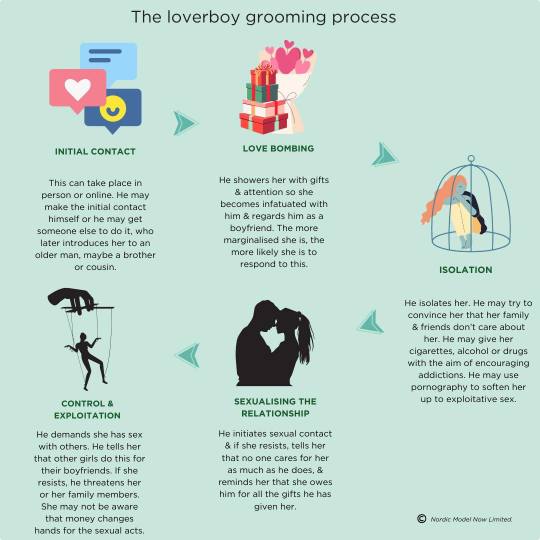
#anti sex industry#anti sex trade#anti sex work#radical feminism#anti prostitution#radfemblr#radfeminism#anti sex trafficking#marxist feminism#radical feminist community#radblr#radical feminist safe#radical feminists do interact#radical feminst#radical feminists do touch#lover boy#prostitution#nordicmodelnow#anti pornography#antiporn
232 notes
·
View notes
Text
Human Rights or Hidden Agendas: Exposing Well-Known NGOs and Prostitution Legalization - Donor Beware
Many of us might regularly or occasionally donate money to NGOs, and you are probably aware that there are many NGOs that support pimps and sex buyers rather than people in prostitution, advocating for the legalization of prostitution.
However, some might not be aware that very famous NGOs like Amnesty International (AI), Human Rights Watch (HRW), Open Society Foundations (OSF), Human Rights Campaign (HRC), International Women's Health Coalition (IWHC), and even the Global Alliance Against Traffic in Women (GAATW), International Women's Rights Action Watch Asia Pacific (IWRAW Asia Pacific), as well as some UN bodies and agencies like the World Health Organization (WHO), United Nations Development Program (UNDP), United Nations Population Fund (UNFPA), International Labour Organization (ILO), and the Joint United Nations Programme on HIV/AIDS (UNAIDS) are among them.
This makes the pro-prostitution movement feel justified in claiming theirs is a ‘human rights’ approach to prostitution. For those who wish to genuinely support individuals in prostitution and porn, it's advisable to reconsider donating to these organizations. Instead, direct your support to NGOs that take a firm stance against prostitution and pornography.
Here is a compelling (but shortened) paragraph delving into NGOs advocating for the legalization of prostitution and the origins of this movement as discussed in Julie Bindel's book, 'The Pimping of Prostitution':
'On 8 March 2015, the journalist and eminent anti-trafficking activist Ruchira Gupta was on her way to the Apollo Theatre in New York, to give the keynote address as the Woman of Distinction Awardee at the non-governmental organisation Commission on Status of Women (CSW). Gupta was traveling with Phumzile Mlambo-Ngcuka, UN Under-Secretary General and Executive Director of UN Women.
[...]
Women and government representatives from all over the world attend this event, and Gupta was thrilled to have been given this award because it was an acknowledgement from her peer group of the work she had been doing to end sex-trafficking.
Just before arriving at the Apollo, Gupta received an email from a committee member of the New York CSW telling her not to mention the word ‘prostitution’ in her speech. ‘I was aghast since my entire work was with prostituted women and my award was for that work’, Gupta said at the time.
Gupta emailed the committee member and asked how she could give a speech in which she did not represent the views of the members of her organisation? ‘[The woman who emailed me] replied that she had been asked by the Chief of Civil Society at UN Women to stop me from speaking about prostitution’, says Gupta. ‘This was bizarre. Why should an NGO body try to censor me and stop me from speaking about a subject for which they had given me an award?’
The reason soon became apparent to Gupta. The NGO had received money from an organisation that supports and profits from the sex trade. The Chief of Civil Society at UN Women had been circulating a letter, via her official UN Women email address, to all NGOs asking for prostitution to be legalised as ‘sex-work’, and pimping and brothel-keeping to be legalised as ‘employers’ of poor women.
Gupta recalls:
‘I went ahead and gave the speech I had prepared about how prostitution was an outcome of inequality and not a choice ’, says Gupta. ‘I said that the punishment of pimps, Johns and brothel-keepers was what prostituted women and their daughters in India desperately wanted. All they had was the law to protect them. [...] I pleaded for UN Women to punish those who buy and sell her and to invest in reducing her vulnerabilities. I reminded them the UN Declaration of Human Rights stood for protection of the weak and not the powerful.
At the end of her speech, Gupta received a rousing reception from the delegates, comprising feminist NGOs from every corner of the globe. But not everyone was happy with her. ‘Unfortunately, I saw the Chief of Civil Society whisper and walk away with the head of UN Women before I spoke’, says Gupta.'
Perhaps, it is not surprising that those NGOs, prioritizing money over human rights, now strongly advocate for complete decriminalization. This inclination may be influenced by the fact that organizations like UNAIDS and the WHO have their headquarters in Geneva, where a fully legalized prostitution system is in place. During her research on Switzerland's legalized prostitution system, Julie Bindel learned from a woman working in a Geneva-based human rights organization that her colleagues are active users of prostitution:
Friday night is known as ‘ho’ night. The men in my team literally brag about going to prostitutes. One of the roles in the team is to raise awareness about trafficking and irregular migration, but these guys go out and abuse them without any thought.
Engaging in sex buying while formulating policies on prostitution constitutes a clear conflict of interest. My understanding is that the purchase of sex by UN staff is already prohibited according to the UN Staff Regulations and Rules, as clarified in the Secretary-General's bulletin ST/SGB/2003/13.
Exchange of money, employment, goods or services for sex, including sexual favours or other forms of humiliating, degrading or exploitative behaviour, is prohibited.
However, it seems that the these rules and regulations are not enforced, especially within certain UN bodies and subsidiaries located in Geneva, leading to a tendency for biased policy decisions. Naturally, individuals who purchase sex would favor an approach that legitimizes prostitution, as opposed to the Nordic Model, which criminalizes both sex buying and all forms of pimping.
By the way most of the major funding organizations supporting women's organizations, such as the Open Society Foundation, Bill and Melinda Gates Foundation, Mama Cash, and various UN bodies, have been influenced by lobbyists from the sex industry. As a result, these funding bodies typically do not allocate funds to organizations operating in this field unless they endorse complete decriminalization. Consequently, women's organizations not in favor of full decriminalization often face a lack of financial support, especially those in the global South who may lack resources for a website, making them relatively unknown on the international stage. These organizations heavily rely on donations from private citizens. So before you donate to an NGO, check where they stand on prostitution and porn.
#anti sex industry#anti sex trade#anti sex work#radical feminism#anti prostitution#radfemblr#radfeminism#anti sex trafficking#feminism#marxist feminism#radical feminist community#radblr#radical feminist safe#radical feminists do interact#radical feminst#anti pornography#antiporn#ngo#julie bindel
27 notes
·
View notes
Text
Recommended Books on Porn

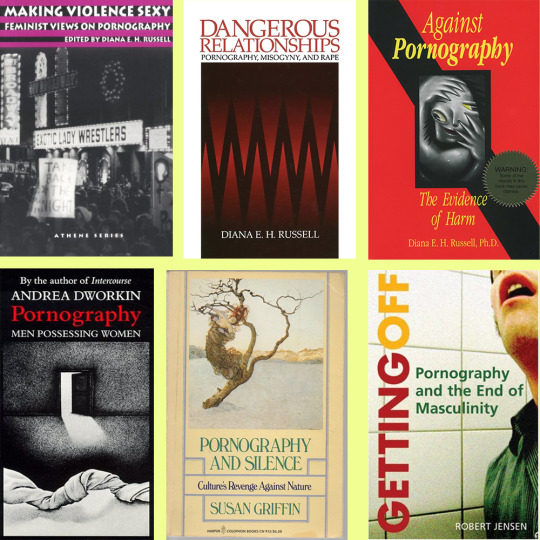
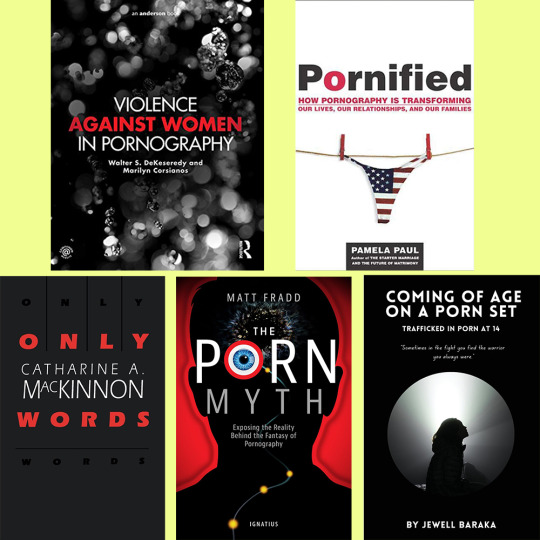

For more recommendations and resources, check out our r/antisexwork subreddit wikipage: https://www.reddit.com/r/antisexwork/wiki/resources/
#anti sex industry#anti sex trade#anti sex work#anti pornography#antiporn#radical feminism#radfemblr#radfeminism#marxist feminism#radical feminist community#radblr#radical feminist safe#radical feminists do interact#books and reading#book recommendations#anti porn
47 notes
·
View notes
Text
True Sex Positivity Stands Against Pornography and Prostitution
I want to share my thoughts on why being anti-porn and anti-prostitution is sex-positive.
At its core, sex positivity seeks to challenge and overcome societal stigmas, shame, and negativity surrounding sexuality. However, pornography falls short of this ideal by perpetuating unrealistic standards and objectifying participants. It often involves the shaming of women, calling them terms like 'dirty sl*ts' and using racial slurs, which is decidedly not (sex-)positive.
In a sex-positive framework, consent is paramount. However, the power dynamics inherent in commercial sex transactions compromise the concept of freely given and informed consent. Sex trafficking is widespread in the sex trade and not a peripheral phenomenon, with the grooming of children, teens and young women into porn and prostitution presenting a significant problem.
Studies reveal that women in pornography production come from similar adverse backgrounds as women in prostitution. They are typically young, financially strapped, suffering from poor mental health, and victims of sexualized abuse during their childhood or young adult years. Pimps and pornographers target these marginalized women and girls who are more easily groomed, manipulated, controlled, silenced, and exploited.
The vulnerability and lack of bargaining power of these women allow pornographers, johns, and porn watchers to breach their personal boundaries. To sustain themselves financially, many women are forced to offer sex services they wouldn't otherwise or produce content more frequently, often containing greater levels of violence and humiliation. Consequently, female actors and prostituted women endure everything from cuts and bruises to vaginal and throat tears and anal relapses. Many are on drugs and painkillers to cope. Studies indicate that most prostituted women experience PTSD due to prostitution, whether they work in a country where it's legal or not.
Pornography and prostitution also normalize the demand for male access to women's bodies and violence in sexual acts, portraying women as objects to be used and hurt. Numerous studies have shown that pornography has a negative effect on men's attitudes toward women and not only that. There are more than a hundred studies proving the harm of porn (check out Truth About Porn website, it's ever-growing database dedicated to the research on the harmful effects of pornography). Something that is harmful cannot be positive!
We really should reclaim the term "sex-positive" and make it our own. Words wield considerable power, and those in favor of the sex trade recognize this, using it to their advantage. By labeling opponents of the sex trade as sex-negative, they effectively discourage critical thought about our stance. After all, most people aspire to be seen as "sex-positive". This not only sounds more appealing but also insinuates that those who aren't considered sex-positive are inherently sexist, prudish, and backwards—a stereotype frequently perpetuated.
However, taking an anti-prostitution and anti-porn stance allows us to promote and focus more on alternatives that empower individuals, focusing on comprehensive sex education, mental health support, and economic opportunities. This approach prioritizes agency, ensuring that individuals can make choices aligning with their own desires and well-being. This embodies genuine sex-positivity.
Furthermore, pornography not only perpetuates traditional gender roles and reinforces harmful stereotypes but also predominantly caters to men, prioritizing their pleasure and contributing to the reinforcement of inequality. A content analysis of best-selling pornographic videos revealed that 88% of scenes portrayed physical violence, 48% of scenes portrayed verbal aggression (e.g., insulting, threatening, and using coercive language), and 94% of aggressive scenes portrayed women as targets of aggression. Taking an anti-porn and anti-prostitution stance involves challenging these patriarchal structures. It's about fostering a more egalitarian society where individuals, regardless of gender, can experience fulfilling sexual relationships free from the constraints of rigid norms.
#anti sex industry#anti sex trade#anti sex work#radical feminism#anti prostitution#radfemblr#radfeminism#anti sex trafficking#feminism#marxist feminism#anti pornography#antiporn#radical feminist safe#radblr#radical feminists do interact#radical feminst#feminist#radical feminist community#radical feminists do touch#sex positive
83 notes
·
View notes
Text
Liberal pro-prostitution ideology is getting women executed in the U.S. Let that sink in.
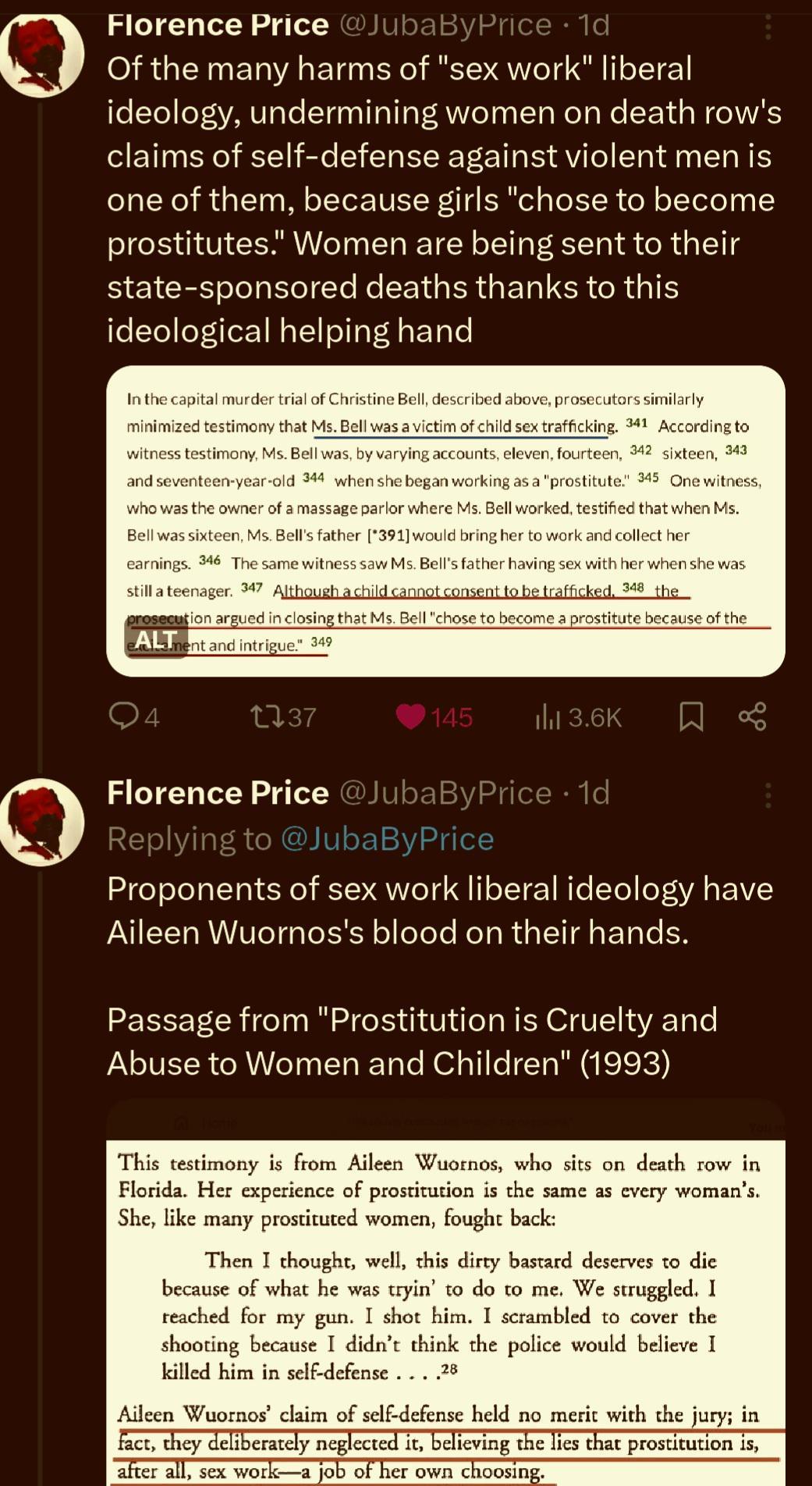
#anti sex trade#anti sex work#radical feminism#anti prostitution#anti sex industry#radfemblr#anti sex trafficking#radfeminism#marxist feminism#radical feminist safe#radical feminist community#radblr#radical feminists do interact#radical feminists do touch#sex work#marxism#marxist#radical feminst#radical feminist#prostitution
22 notes
·
View notes
Text
German Petition for the Nordic Model – Please Sign if You Can!
Hey everyone,
There’s a petition in Germany advocating for the Nordic Model. Currently, prostitution is legalized in Germany, and the petition calls for a change to the Nordic Model. The petition was initiated by Netzwerk Ella, a survivor-led initiative advocating for the abolition of prostitution.
If you have German citizenship or live in Germany, please consider signing the petition! It needs at least 30,000 signatures to be debated in the Bundestag (the German Parliament).
Here is the link:
https://www.openpetition.de/petition/online/deutschland-muss-aussteigen-nordisches-modell-jetzt-2
Please share it with your german friends and relatives.
#anti sex industry#anti sex trade#anti sex work#radical feminism#anti prostitution#radfemblr#radfeminism#anti sex trafficking#marxist feminism#radical feminist community#feminism#radical feminst#radical feminist safe#radblr#radical feminists do interact#nordicmodelnow#sex work is not work#nordischesmodelljetzt#nordischesmodell#nordicmodel#swerf ally#swerf safe#swerfs are right
364 notes
·
View notes
Text
Myths and misinformation about the Nordic Model
This post provides access to a handy downloadable PDF that rebuts some common myths and misinformation about the Nordic Model (also known as the Equality Model, Abolitionist Model and Sex Buyer Law).
Topics covered:
What is The Nordic Model?
Neither full decriminalisation nor legalisation reduce the individual or wider societal harms associated with prostitution
Safety, personal violence and homicide data
Full decriminalisation and New Zealand
Myth: The Nordic Model “drives the sex trade underground”
Myth: There is a correlation between adoption of the Nordic Model and increases in human trafficking
Autonomy and human rights
Stigma and reducing demand
Harms associated with prostitution.
The exclusion of survivors and organisations which support them from consultations about prostitution and the sex industry.
Wider implications of full decriminalisation
Commonising costs and privatising profits – the case of the sex industry
Download the PDF by clicking here.
#anti sex industry#anti sex trade#anti sex work#radical feminism#anti prostitution#radfemblr#radfeminism#anti sex trafficking#marxist feminism#nordic model#radical feminist community#radical feminist safe#radblr#radical feminists do interact#radical feminist#equality model#sex work#prostitution
25 notes
·
View notes
Text
From Yachting to Dubai Porta Potty: The Overlooked Role of Money Addiction in Prostitution
Can we talk about money addiction in prostitution?
In anti-prostitution circles, it's often discussed how women get into prostitution through trafficking, grooming, drug addiction, debts, desperation, and similar bad circumstances, but rarely about money addiction. It seems that in our capitalist world, money addiction is seldom addressed and is often viewed either positively or downplayed rather than as a serious addiction. Money addiction (greed for money) is often even seen as an personality trait rather than an addiction. Therefore, many people who are addicted to money don't even recognize their own addiction to it or think it's fine.
Money-addicted individuals exhibit behaviors, such as an insatiable desire for more wealth and possessions, often at the expense of others or to the detriment of their own well-being. So it's really not as harmless as people perceive it to be. Money addiction often stems from a deep-rooted need to compensate for feelings of inadequacy, insecurity, or emotional pain. However, overvaluing money and becoming addicted to it can also be a result of societal conditioning and affirmation from parents and society.
Research shows that most prostituted women don't want to be in the sex trade, and only a small number of women want to be in it. I want to talk about this very small group of women who claim they want to be in it. From what I've noticed, some of those women seem to participate in the sex trade because they are addicted to money and they are often times expensive escorts. These escorts are usually the ones who are advocating for prostitution on various podcasts & Co.
Many already very rich and famous celebrities, as well as popular influencers with a (very) good income, also participate in yachting (escorting on a yacht) or Dubai Porta Potty (traveling to Dubai to get pooped and peed on by wealthy Arab men for large sums of money, it often involves bestiality as well). At this point, it's not even a secret. Yachting, in particular, is constantly talked about. There have been many podcasts and posts all over the internet about rich celebrities and influencers doing it. In fact, it has helped normalize and accept prostitution, and even glamorize it. It has taken away the focus on how prostitution looks for the majority of women and how most women aren't in it because they want to be.
(Trigger Warning - Disgusting Sexual Content:) Let's face it, would you really be willing to have gang bangs for several days to a week with a bunch of (probably) ugly, old guys who don't respect you, want to beat the shit out of you, humiliate you, piss on you, poop in your mouth, and make you have sex with an actual animal (bestiality) in a country where it is illegale (risk of being imprisoned) for €30,000 if you were already financially stable? Would you do the same if you were offered one million euros if you were already a famous celebrity worth €100M? I doubt it, unless you are addicted to money. However, this is what is being offered (30k - 1M) in Dubai Porta Potty for all of those things combined to people who most of the time already have money (influencers and celebrities).
Sure, one could argue that porn has desensitized or even groomed many people to like some of those practices, and the "no kink shaming" crowd has helped normalize it, but still, those are not everyday normal practices, especially bestiality, which is illegal in many countries, including the United Arab Emirates. Even someone who doesn't mind BDSM wouldn't just do all of it with strangers in another country, where it is illegal and they are not really in dire need of money if there isn't an underlying issue (like a money addiction) behind it.
I think this aspect of money addiction is crucial to understand when discussing the complexities of prostitution. The conversation often neglects the psychological and societal factors that drive some women to enter and stay in the sex trade willingly. It's also important to challenge the societal norms that glorify wealth accumulation at any cost. Money addiction really needs to be talked about more often and be taken more seriously.
I'd love to hear your thoughts on it.
#anti sex industry#anti sex trade#anti sex work#radical feminism#anti prostitution#radfemblr#radfeminism#anti sex trafficking#feminism#marxist feminism#radical feminists do touch#radical feminist safe#radical feminists do interact#radical feminist community#addiction#anti pornography#antiporn#anti capitalism#yachting#porta potty
36 notes
·
View notes
Text

Check out or Anti-Sex Trade Subreddit for more quotes: https://www.reddit.com/r/antisexwork/
#lydia cacho#anti sex industry#anti sex trade#anti sex work#anti sex trafficking#anti prostitution#radfemblr#radical feminism#radfeminism#marxist feminism#radical feminist community#radical feminist safe#radical feminists do interact#radblr#radical feminst#human trafficking#child trafficking
724 notes
·
View notes
Text
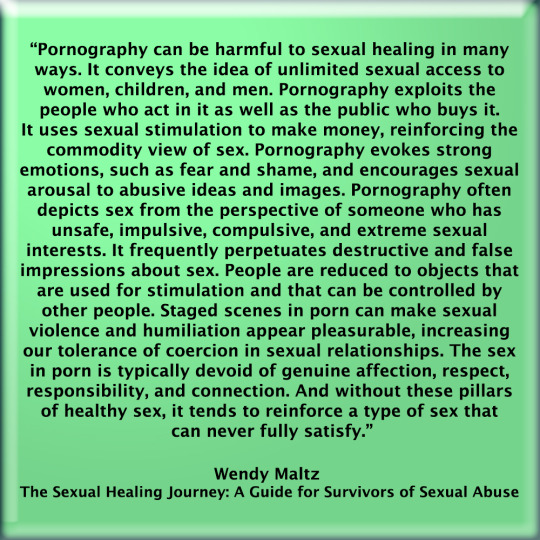
From the Anti-Sex Trade Subreddit: https://www.reddit.com/r/antisexwork/
#anti sex industry#anti sex trade#anti sex work#radical feminism#anti prostitution#radfemblr#radfeminism#anti sex trafficking#marxist feminism#radical feminist community#radblr#radical feminist safe#radical feminists do interact#radical feminst#anti pornography#antiporn#sexual healing#sex abuse#sex health#radical feminists do touch#wendy maltz
14 notes
·
View notes
Text
The Hard Facts: Exposing the Real Earnings of OnlyFans Creators
Despite the numerous articles promoting the idea of making money on OnlyFans and its apparent greatness, the actual earnings of creators tell a different story. Only a very small group of women, mainly celebrities and well-known influencers outside of OnlyFans, are making substantial amounts. If you don't fall into this category, hitting the million-dollar mark on OnlyFans is impossible, regardless of the claims some creators make on TikTok.
In reality, many of these creators showcase their fake lavish lifestyle, attributing it to a 5 percent commission on each new referral. Essentially, they deceive their audience, exploiting those who believe these lies for financial gain.
Here are some real Numbers:
There are 2.1 million creators on OnlyFans but only a little over 300 creators (0.01%) earn $1M+ per year and only a little over 16,000 creators (0.76%) earn $50,000+ per year before taxes! However, successful creators are often represented by agencies that assist them in promoting their accounts. These agencies also hire individuals to impersonate the creators and engage with their audience. These agencies typically take an additional 15-50% of the creators' earnings!
The median account makes $180 per month and the top 10% OnlyFans creators earn only around $1000 a month before taxes.
The top 1% of the creators earn 33% of the income, the top 10% of the creators earn 73% of the income.
The average OnlyFans subscription is $7.20. Out of that $5.76 is kept by the creator and $1.44 is kept by the platform, as OnlyFans deducts a 20% fee from the creator's earnings.
The average OnlyFans account has only 21 fans!
Additionally, according to OnlyFans creators if a creator decides to pause their activity on OnlyFans for a period, they won't receive earnings for their existing content unless they consistently upload new photos and clips. OnlyFans discontinues payments for new and existing subscribers, retaining the generated revenue when no new material is uploaded for a few months.
Stop buying into the hype and propaganda; only around 0.77% are earning sufficient income on the platform to sustain a living. This number is very generous; if we account for agency fees, taxes, and promotional expenses, the percentage would likely be cut in half (0.39%)!
#onlyfanz#onlyfans model#anti pornography#anti sex industry#anti sex trade#anti sex work#anti prostitution#anti sex trafficking#radical feminism#radfeminism#marxist feminism#radfemblr#feminism#radical feminists do touch#radical feminist safe#radical feminists do interact#radical feminist community#onlyfansbabe
27 notes
·
View notes
Text
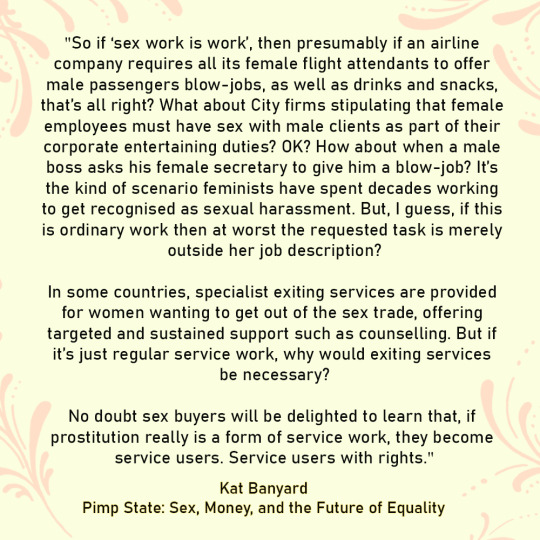
Check out or Anti-Sex Trade Subreddit: https://www.reddit.com/r/antisexwork/
#anti prostitution#anti sex industry#anti sex trade#anti sex work#radical feminism#anti sex trafficking#radfemblr#radfeminism#equality model#feminism#radblr#prostitution#marxist feminism#nordic model#sex work#radical feminist community#radical feminist safe#radical feminists do interact#radical feminst
33 notes
·
View notes
Text


What is the Nordic Model?

Study of UK sex buyers & Study of women in prostitution

#anti prostitution#anti sex industry#anti sex trade#anti sex work#radical feminism#anti sex trafficking#radfemblr#radfeminism#nordic model#equality model#prostitution#sex work#marxist feminism#feminism
31 notes
·
View notes